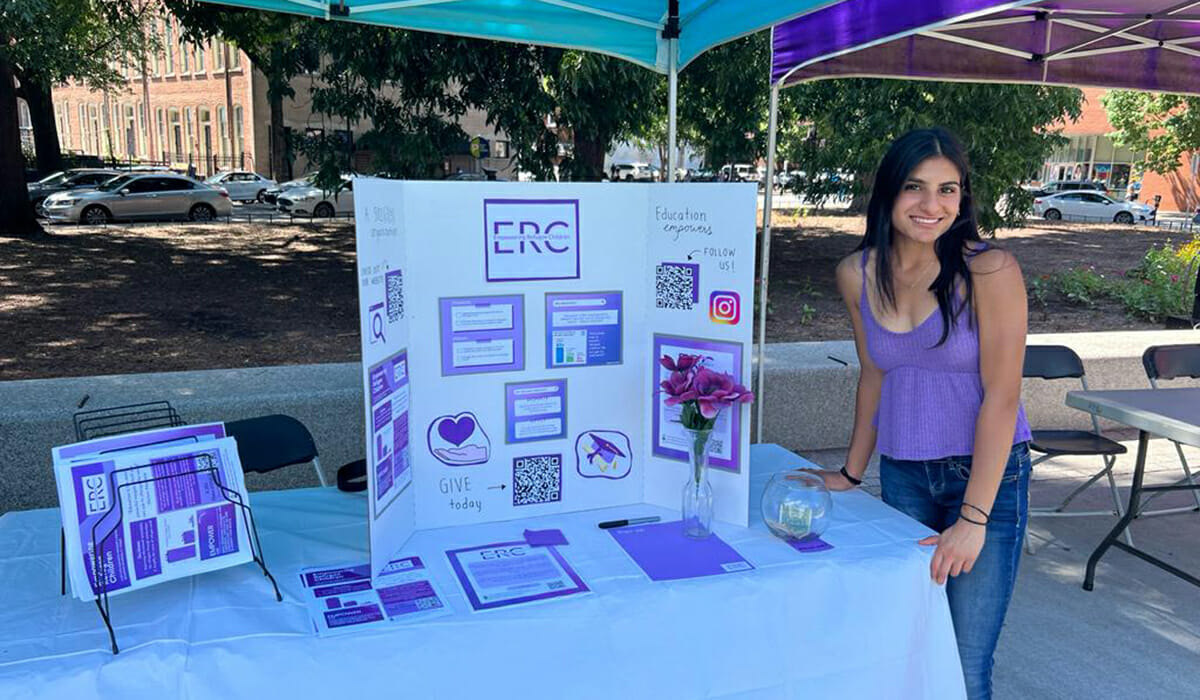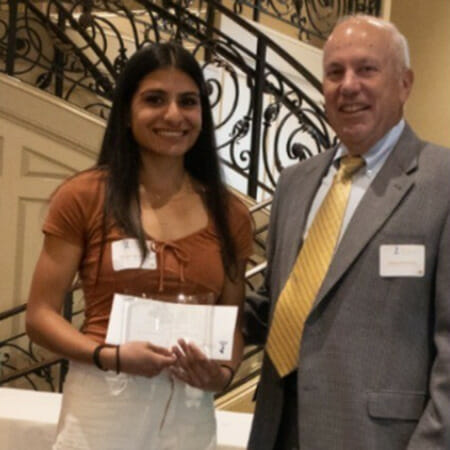High School Student Provides Financial Support for Displaced People Pursuing Higher Education

Meet Daily Point of Light Award honoree Tanya Sachdev. Read her story and nominate an outstanding volunteer or family as a Daily Point of Light.
After she learned about the Afghan Refugee Crisis in 2021 on the radio, Tanya Sachdev was moved to make a difference. So, she set out to volunteer weekly with an organization that provides services to displaced people, Refugee Hope Partners. This led her to start a local chapter of STAR: Students Together Assisting Refugees at her school and after learning that only 3% of displaced children have access to secondary education, she was even inspired to start her own nonprofit, Empowering Refugee Children.
As Tanya tries to stay educated on the global refugee crisis, she continues to raise thousands of dollars to support displaced individuals and inspires her whole community to get involved.
What inspires you to volunteer?
For me, it was actually one moment. I was driving to school with my mom and on the way to school we had National Public Radio (NPR) on. NPR was sharing a story on the Afghan refugee crisis — this was back in August of 2021. In that story, just hearing about how impactful the reporter was in sharing the story really moved me, because I had never heard about the global refugee crisis. I never knew anything about the sheer extent of the crisis. Hearing about that led me to wanting to learn more.
So, I began researching and I learned about this crisis — how people are forcibly displaced and also how there were many refugee organizations in my own community. I decided to start a club at my school called Students Together Assisting Refugees (STAR), which is a club branch for an international organization that has over 30 club branches total. Through that organization, I began meeting with my peers and working to spread awareness about the global refugee crisis and to help better the lives of displaced people in our own community. Those efforts eventually brought me to work at organizations such as Church World Service (CWS) Durham and Refugee Hope Partners, two neighboring service organizations in my area. I began to be a weekly volunteer at Refugee Hope Partners, and I participated in their homework help and their English education programs from elementary to high school. As I became more involved with that organization, I realized a little bit about the educational accessibility disparity faced by community members who have been displaced and that made me want to do something more and lead to the nonprofit I created: Empowering Refugee Children (ERC).
Describe your volunteer role with the different organizations you are a part of.
I’ll start with ERC, since it happened because of my work with Refugee Hope Partners and CWS. ERC is my 501(c)(3) organization that I started last year after a session working with high school students with Refugee Hope Partners. One of the students there shared her dream of attending college and getting a four-year degree in History. But due to her family’s financial obligations, she shared that it might not be possible.

After learning that only 3% of displaced people are able to pursue higher education, I wanted to do something. I started conversations with my local organizations about ways that I as an individual could help out, and they shared about how scholarships and financial contributions are the most beneficial. So, ERC began with the goal of improving educational accessibility and amplifying voices of displaced youth. The work for that organization was definitely very difficult, especially being a 17-year-old girl advocating for your nonprofit and starting it from the ground up. But this past summer we awarded our first $1,000 scholarship to a student from Tanzania. Just seeing her reaction and seeing the amount of support that an organization like ERC has gotten has really made it all worth it. That’s one of the biggest passion projects — scholarships.
With Refugee Hope Partners, I’m a weekly volunteer. They’ve been such an integral part of this journey of my advocacy and making me more involved in the community. For example, I’m a part of their programs, as I mentioned, like their homework and English language programs, and this summer I also had the opportunity of leading a health class for around 30 children from displaced families. It was so great. That was one of my highlights of the summer — getting to create the curriculum, working in Canva, working on PowerPoints and finding books and videos to help teach about topics covering everything from nutrition to oral health.
I try my best to do weekly volunteering for their shifts. I genuinely treasure the conversations that I have with the high school- and college-aged students, which is a completely new experience from the elementary school kids that I worked with over the summer. It’s just so great getting to talk and bond over nominal things like pop culture gossip, as well as to bigger topics like talking about our days and some of the bigger issues that they face.
What’s been the most rewarding part of your work?
One of the most rewarding parts of the work is not only seeing the tangible impact made through the money raised or the products donated, but rather the support from individuals in the community wanting to be a part of working towards and helping the displaced community. That has been really rewarding.
For example, just seeing the support behind ERC, or even the STAR Club at my school where faculty reached out to ask about how they can further their involvement — so many people care about the mission and it has been so amazing. As a 17-year-old, it’s really hard to show that an organization can contribute to something much bigger than itself and having that support has been the most beautiful thing.
What have you learned through your volunteer experiences?
One thing that I’ve learned is the importance of sharing stories and building connections. Personally, I noticed that at STAR Club, it was really easy for me to stand up in front of a crowd and talk about the statistics. But it wasn’t until I got involved with the Refugee Hope Community that I got to share stories and connect with people on a personal level, and I realized that people are more important than the statistics and the numbers.
One of the events that we put on last year was a dinner with a documentary event where we were showcasing a documentary and had dinner provided — it was a free event because we wanted to really spread awareness. The event struck a chord with so many people that reached out to me afterwards and wanted to learn more about the organizations I’m a part of. We had a panel discussion with representatives from local organizations and it was just the awareness event that made so much more of a difference than just donating did.
What are your goals for Empowering Refugee Children?
One of my goals is to continue working towards building ERC to continue handing out scholarships. I want to be able to continue this program, because there’s a definite need for educational resources. I’d also like to explore my own personal interests of healthcare accessibility and continue to stay involved with the community of displaced people.
Why is it important for others to get involved in causes they care about?
I think that being able to work for something beyond myself has been ultimately such a rewarding experience. So, for individuals that are interested in a topic or want to contribute and lend their time and talent, I’d say 100% go for it. It’s so rewarding, and you get to explore more about your own identity while also supporting communities and individuals.
Tell us about future partnerships, programs or events that you are excited about.
ERC has opened our next set of scholarships for this upcoming scholarship cycle. The deadline is in December. We’re really excited to be able to hand out another scholarship with the support of generous donors and donations.
Do you want to make a difference in your community like Tanya? Find local volunteer opportunities.
